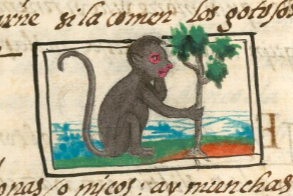ozomatli (FCbk11f14v)
This iconographic example, featuring a monkey (ozomatli), is included in this digital collection for the purpose of making comparisons with related hieroglyphs. The term selected for this example comes from the text near the image in the Digital Florentine Codex. There is no gloss, per se. This example shows a profile view of a dark gray ozomatli, facing the viewer’s right. Its left hand goes up to the facial cheek that is not visible. Its right hand grabs onto a nearby tree. It is sitting on some grass. Its tail rises and curls at the end. The monkey’s face shows dark pink eyes, mouth, and nose. The hair on its head sweeps forward. Here, it is an animal in a landscape, showing European artistic influence.
Stephanie Wood
The ozomatli is a day name in the tonalpohualli religious divinatory calendar. Therefore, it was also a personal name. In the Nahuatl hieroglyphs of this name as it appears in the Matrícula de Huexotzinco, the monkey is typically represented by a head only, and the sweeping hair that goes up and forward is exaggerated. The monkey’s face can also have a definite shape, with curves around the eyes and around the mouth. Sometimes it wears an earring. Ozomatli was also a deity name, and the oval earrings with a point at the bottom may have suggested the shape of a conch shell. [See: Desmond Morris, Monkey, 2013, p. 41.] Another interpretation is that these earrings were from Xochipilli. [See: Penny C. Morrill, The Casa del Deán, 2014, 178.] A few examples of the ozomatli name glyphs (shortened to Ozoma) appear below.
Stephanie Wood
Oçomatli
ozomatli
Stephanie Wood
1577
Jeff Haskett-Wood
monos, animales
ozoma(tli), a monkey, https://nahuatl.wired-humanities.org/content/ozomatli
el mono
Stephanie Wood
Available at Digital Florentine Codex/Códice Florentino Digital, edited by Kim N. Richter and Alicia Maria Houtrouw, "Book 11: Earthly Things", fol. 14v, Getty Research Institute, 2023. https://florentinecodex.getty.edu/en/book/11/folio/14v/images/0 Accessed 7 October 2025.
Images of the digitized Florentine Codex are made available under the following Creative Commons license: CC BY-NC-ND (Attribution-NonCommercial-NoDerivs 4.0 International). For print-publication quality photos, please contact the Biblioteca Medicea Laurenziana ([email protected]). The Library of Congress has also published this manuscript, using the images of the World Digital Library copy. “The Library of Congress is unaware of any copyright or other restrictions in the World Digital Library Collection. Absent any such restrictions, these materials are free to use and reuse.”




